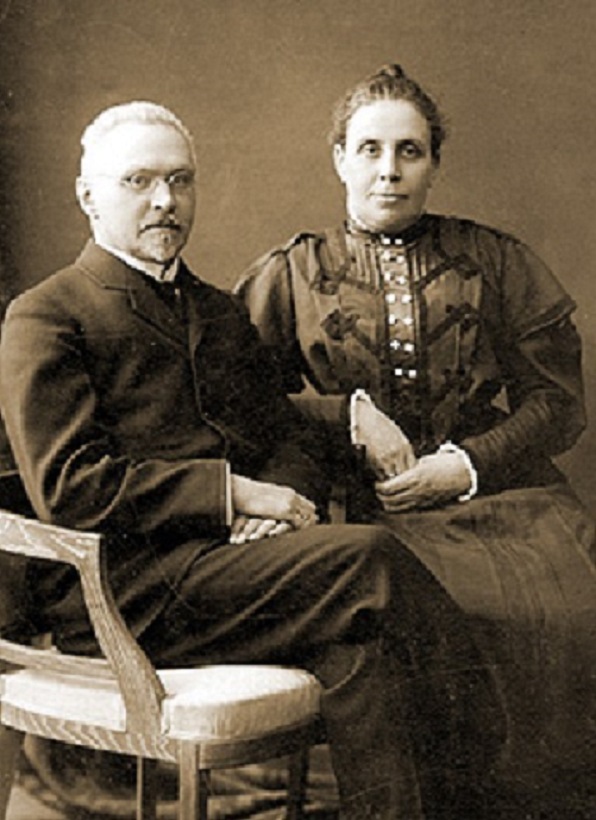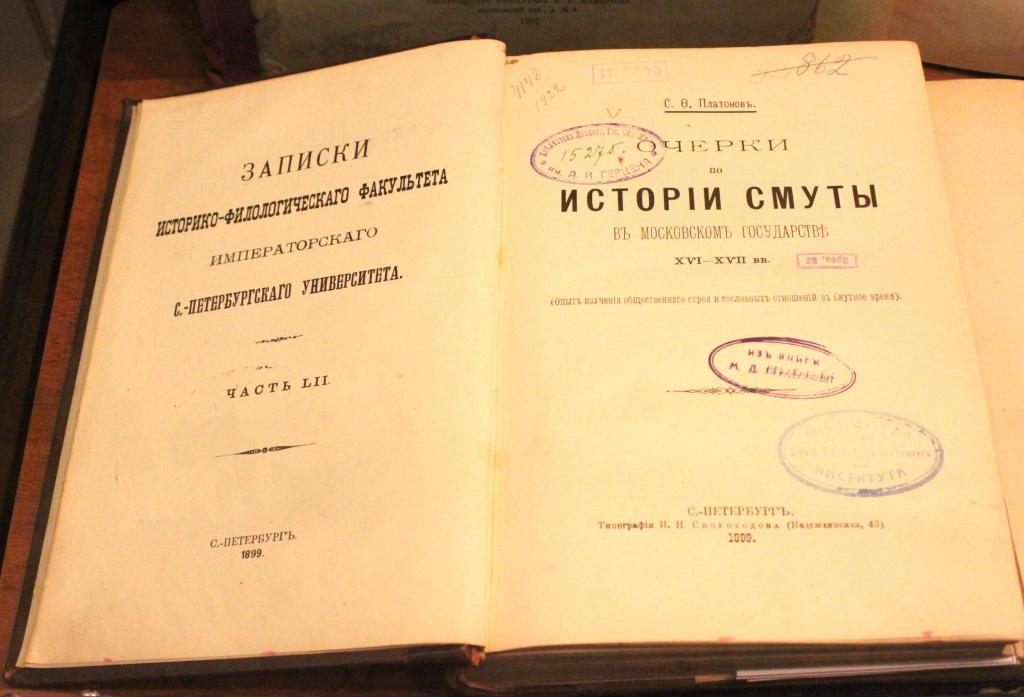Historian Platonov Sergey Fedorovich - a researcher who lived at the turn of the XIX-XX centuries. Most of his work is devoted to the Time of Troubles in Russia. He also was actively engaged in archeography, collected and published sources, published biographies of statesmen, textbooks on Russian history, which are popular in our time.
Childhood and youth
Sergei Fedorovich Platonov was born in Chernigov on August 9, 1860. He was the only child in the family. His ancestors are Kaluga peasants. The boy’s father and mother, Fedor Platonovich and Cleopatra Alexandrovna, were indigenous Muscovites. When their son was born, F.P. Platonov worked as the head of the Chernihiv provincial printing house. After 9 years, he was transferred to St. Petersburg. There, Fyodor Platonovich was entrusted with the post of manager of the printing house of the Ministry of the Interior, and then he was granted the title of nobleman.
Later, all the pedagogical and scientific activities of the historian S.F. Platonov proceeded in the northern capital, although he had a special love for Moscow since childhood. In the years 1870-1878. He studied at the gymnasium, where a teacher of Russian literature had a great influence on him. At this age, Sergei Fedorovich did not plan to become a historian. He dreamed of being a writer, and wrote poems.
Studying at the University
At 18, Platonov entered St. Petersburg University. While studying at the Faculty of History and Philology, he was fascinated by the lectures of teachers K. N. Bestuzhev-Ryumin, V. I. Sergeevich and V. G. Vasilievsky. This determined the final choice of the field of activity of the future scientist. Under the patronage of Bestuzhev-Riumin, S. Platonov was left after graduating from university in 1882 at the department to prepare for the defense of the dissertation.
As the object of study, he decided to choose the Time of Troubles (1598-1613), when the rule of the kings of the Rurikovich clan was interrupted, and the country was in a difficult economic situation. The future scientist-historian Platonov worked in good faith: for the development of his dissertation, he used over 60 works of ancient Russian writing, and the total duration of the research was 8 years. To study the necessary documents, he visited 21 archives of Moscow, St. Petersburg, Kiev, Kazan, examined the vaults of 4 monasteries and the Trinity-Sergius Lavra.
In 1888, he successfully defended his master's degree, which allowed Sergei Fedorovich to get the post of privat-docent, and a year later - a professor at the university. After publication, his master's monograph was awarded the RAS Uvarov Prize, which was awarded for outstanding works on Russian history.
Teaching activities
After graduation, the historian Sergei Platonov began to engage in teaching work, which lasted more than 40 years. At first he was a teacher in high school. In 1909, Platonov published a school textbook on history. At 23, the scientist began to give lectures at the Bestuzhev courses. It was one of the first higher education institutions for women in Russia. Sergey Fedorovich also worked at the Pushkin Lyceum, from 1890 he became a professor at St. Petersburg University, and in 1901-1905. - his dean. He developed courses on history and taught in other educational institutions.
Since 1903, he taught at the Higher Pedagogical Women's Institute. Subsequently, Sergei Fedorovich became its director. Under him, this institution became a whole complex, which included a kindergarten, a gymnasium, a preparatory class and an institute with 2 faculties.
Research work
Simultaneously with his pedagogical activity, Sergey Fedorovich conducted research work. In the first publication, which was part of the dissertation, he looked for the causes of strife during the Time of Troubles and the methods by which they were overcome. The merit of the Russian historian Platonov is that he not only thoroughly studied archival materials, but also published many valuable primary sources.
In 1894, Sergei Fedorovich became one of the members of the Archaeographic Commission, and later he took part in the All-Russian Archaeological Congresses. The works of the historian Platonov brought him fame in these years in the teaching and scientific circles. He is elected to members of scientific and historical societies working in different cities.
The greatest activity of his scientific activity occurred in the 20s of the twentieth century. In 1920, he was elected an academician of the Russian Academy of Sciences, in 1925 he was appointed director of the Library of the Academy of Sciences, and in 1929 - secretary of the department of humanities of the USSR Academy of Sciences. In addition, he worked as the head of the department of Russian and Slavic archeology in the Russian Archaeological Society and the chairman of numerous societies ("Old Petersburg", "Pushkin Corner", lovers of ancient writing and others).
In the 20s. He not only worked hard, but also traveled. Sergey Fedorovich visited Paris and Berlin, where he talked with his scientific colleagues.
At this time, he publishes several books from a series of historical portraits ("Images of the Past"):
After a trip to the north of Russia, Platonov published a number of articles about the past and the development of this land, as well as a book on the early relations of the country with Western European states “Moscow and the West in the 16th-17th centuries”.
In these years, Sergei Fedorovich also began work on the work “History of Russia” in 2 parts, but failed to finish it due to political persecution.
Academic Affairs
At the end of the 20s. the folding of the NEP began. At the same time, the unprecedented terror of the Soviet regime against the intelligentsia unfolded. The Russian historian Platonov became the target of harassment from the school of M.N. Pokrovsky. The scientist was accused of anti-Soviet, called the class enemy on the historical front, a collection of slanderous articles was issued against him.
January 12, 1930 Sergei Fedorovich was removed from all administrative work and was arrested along with his youngest daughter. This period in the life of the scientist coincided with personal grief in the family - in the summer of 1928 his wife died. Despite difficulties, he continued to work on his monograph History of Russia. Perhaps this was a kind of outlet for him.
OGPU attracted more than 100 people in the fabricated “Academic Case”, including four academicians. A large number of Leningrad and Moscow scientists were arrested, the system of historical and cultural local history was completely destroyed. The historian Platonov was first charged with concealing important political documents, and then with leading a monarchist conspiracy against the Soviet regime.
Link
Sergei Fedorovich was in the house of pre-trial detention for 11 months, and then 8 months in the Kresty detention center in St. Petersburg. In August 1931 he was sentenced to 3 years of exile in Samara, but his daughters were allowed to accompany his father. They settled on the outskirts of the city. On January 10, 1933, the historian Platonov died of acute heart failure. The body of the scientist was buried in the city cemetery.
After the death of Sergei Fedorovich, in all historiography textbooks he was assigned a cliché of a monarchist, a teacher of children of the imperial family. In the 1960s he was completely rehabilitated and restored to the list of academicians.
Personal life
In June 1885, Sergei Fedorovich married Nadezhda Nikolaevna Shamonina. Her family came from the Tambov nobles. In her youth, she studied at the Moscow girls' gymnasium of Sophia Nikolaevna Fisher. This educational institution Nadezhda Nikolaevna graduated with honors, and then in 1881 entered the historical and philological department of the Bestuzhev courses, where Sergey Fedorovich also taught. Like the historian Platonov, his wife also contributed to science, she translated the works of ancient philosophers, and was also a biographer of the writer N. S. Kokhanovskaya. For a number of publications about her, Nadezhda Nikolaevna received the Akhmatov Prize of the Academy of Sciences.

In marriage, they had 9 children, of whom three died at a young age. His only son, Mikhail, subsequently became a professor of chemistry at the Leningrad Technological Institute. In March 1942 he was shot. Three daughters, Nina, Natalia and Maria, also died in 1942. Daughter Nadezhda emigrated with her family to Paris. Vera, Nadezhda and Nina followed in the footsteps of their mother and graduated from the Bestuzhev courses.
Contribution to Science
The work of Sergei Platonov as a Russian historian was of great importance in science. His main work, "Essays on the History of Troubles," not only has not lost readers over the years, but is also consonant with the present. He was the first at the turn of the XIX and XX centuries, who managed to give a detailed and comprehensive assessment of the history of the Time of Troubles. In his writings, Sergei Fedorovich combined the thoroughness of the source study of the St. Petersburg school of historians and the consideration of the sociological multifactor characteristic of the Moscow school of V.O. Klyuchevsky.

According to Platonov, the task of the historian is not justification of political views, but a reflection of the main moments of the history of society with maximum objectivity. Therefore, the style of his work was characterized by dryness and clarity, lack of rhetoric. Sergei Fedorovich always sought to study and verify the primary sources, and not to follow the provisions that were formulated by the predecessors. Thanks to this, his works, along with the works of Klyuchevsky, are of particular value for historical science.